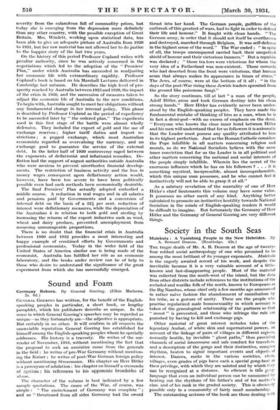Sound and Foam GENERAL GOERING has written, for the benefit
of the English- speaking peoples in particular, a short book, or lengthy pamphlet, which his publishers describe as unique. In the sense in which General Goering's speeches may be regarded as unique—as they fortunately are—the adjective is appropriate. But certainly in no other. It will confirm in all respects the unenviable reputation General Goering has established for himself among the English-speaking peoples whom he specially addresses. His history is a travesty. He writes of the sur- render of November, 1918, without mentioning the fact that the proposal to seek an armistice came from the generals in the field ; he writes of pre-War Germany without mention- ing the Kaiser ; he writes of post-War German foreign policy without mentioning Stresemann. His chapter on Herr Hitler is a paroxysm of adulation ; his chapter on himself a crescendo of egotism ; his references to his opponents broadsides of abuse.
The character of the volume is best indicated by a few sample quotations. The cause of the War, of course, was simple : " The encirclement of Germany was complete " ; and so " threatened from all sides Germany had the sword
thrust into her hand. The German people, guiltless of the outbreak of this greatest of wars, had to fight in order to defend their life and honour." It fought with clean hands. " The German army, in order that it should not itself be overthrown and destroyed, marched through Belgium. It was self-defence in the highest sense of the word." The War ended ; " in spite of all, the troops unconquered carried back their unspotted shield of honour and their victorious banners." But a republic was declared ; " those tra.tors were victorious for whom the very idea of a Fatherland was non-existent. Those cowards who had deserted from the front were victorious, that human scum that always makes its appearance in times of stress." The Jews, of course, were at the bottom of it all ; " in the days of the post-War rising these Jewish leaders sprouted from the ground like poisonous fungi."
So the story continues, till at last " a man of the people, Adolf Hitler, arose and took German destiny into his clean strong hands." Herr Hitler has evidently never been under- stood by the English-speaking peoples. They have made the fundamental mistake of thinking of him as a man, when he is in fact a demi-god—with no excess of emphasis on the demi. " Everyone who knows the close inner bond between Hitler and his men will understand that for us followers it is axiomatic that the Leader must possess any quality attributed to him in its highest perfection. Just as the Roman Catholic considers the Pope infallible in all matters concerning religion and morals, so do we National Socialists believe with the same inner conviction that for us the Leader is in all political and other matters concerning the national and social interests of the people simply infallible. Wherein lies the secret of the enormous influence which he has on his followers ? . . . it is something mystical, inexpressible, almost incomprehensible, which this unique man possesses, and he who cannot feel it instinctively will not be able to grasp it at all."
As a salutary revelation of the mentality of one of Herr Hitler's chief lieutenants this volume may have some value. It possesses no other merit of any kind. Anything better calculated to promote an instinctive hostility towards National Socialism in the minds of English-speaking readers it would be difficult to imagine. But fortunately the Germany of Herr Hitler and the Germany of General Goering are very different things.








































 Previous page
Previous page